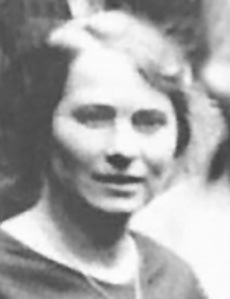Sabina Spielrein
Sabina Spielrein (1885–1942) was a pioneering Russian physician and psychoanalyst, who made significant contributions to the fields of psychology and psychoanalysis. Despite facing numerous challenges, including sexism and anti-Semitism, Spielrein emerged as a key figure in the early development of psychoanalytic theory and practice. Born in Rostov-on-Don, Russia, Spielrein was the eldest of five children in a Jewish family. She encountered psychoanalysis during her psychiatric treatment for hysteria by Carl Jung at the Burghölzli Hospital in Zurich, Switzerland. This experience not only led to her recovery but also sparked her interest in psychoanalysis, leading her to pursue a medical degree and later, a career in the field. Spielrein's relationship with Carl Jung was both personal and professional, and it played a crucial role in her development as a psychoanalyst. However, it was also marked by controversy, including an alleged affair that has been the subject of much speculation and debate. Despite this, Spielrein went on to make her own mark in psychoanalysis, independent of Jung. One of Spielrein's most notable contributions was her concept of the "death instinct," which predated and influenced Sigmund Freud's own theory. Her paper "Destruction as the Cause of Coming into Being" (Die Destruktion als Ursache des Werdens), published in 1912, explored the idea that destruction and sexuality are intertwined in the drive for life. This concept was later incorporated into Freud's theory of the death drive in "Beyond the Pleasure Principle." Spielrein returned to Russia in 1923, where she worked as a psychoanalyst and educator, contributing to the development of child psychology and psychoanalytic education. Despite her efforts to establish psychoanalytic practices in the Soviet Union, her work was eventually suppressed by the Stalinist regime, and she was largely forgotten until the late 20th century. Spielrein's legacy was rediscovered through the publication of her diary and correspondence with Freud and Jung. Her contributions to psychoanalysis, particularly her ideas on the death instinct and the development of the psyche, have been reassessed and recognized for their importance in the history of psychology. Tragically, Sabina Spielrein's life came to an end during World War II. She and her daughters were killed by German soldiers in 1942, in her hometown of Rostov-on-Don, marking a devastating end to a remarkable life and career.
This article is a psychology-related stub. You can help WikiMD by expanding it!
Sabina Spielrein[edit | edit source]
Search WikiMD
Ad.Tired of being Overweight? Try W8MD's physician weight loss program.
Semaglutide (Ozempic / Wegovy and Tirzepatide (Mounjaro / Zepbound) available.
Advertise on WikiMD
|
WikiMD's Wellness Encyclopedia |
| Let Food Be Thy Medicine Medicine Thy Food - Hippocrates |
Translate this page: - East Asian
中文,
日本,
한국어,
South Asian
हिन्दी,
தமிழ்,
తెలుగు,
Urdu,
ಕನ್ನಡ,
Southeast Asian
Indonesian,
Vietnamese,
Thai,
မြန်မာဘာသာ,
বাংলা
European
español,
Deutsch,
français,
Greek,
português do Brasil,
polski,
română,
русский,
Nederlands,
norsk,
svenska,
suomi,
Italian
Middle Eastern & African
عربى,
Turkish,
Persian,
Hebrew,
Afrikaans,
isiZulu,
Kiswahili,
Other
Bulgarian,
Hungarian,
Czech,
Swedish,
മലയാളം,
मराठी,
ਪੰਜਾਬੀ,
ગુજરાતી,
Portuguese,
Ukrainian
Medical Disclaimer: WikiMD is not a substitute for professional medical advice. The information on WikiMD is provided as an information resource only, may be incorrect, outdated or misleading, and is not to be used or relied on for any diagnostic or treatment purposes. Please consult your health care provider before making any healthcare decisions or for guidance about a specific medical condition. WikiMD expressly disclaims responsibility, and shall have no liability, for any damages, loss, injury, or liability whatsoever suffered as a result of your reliance on the information contained in this site. By visiting this site you agree to the foregoing terms and conditions, which may from time to time be changed or supplemented by WikiMD. If you do not agree to the foregoing terms and conditions, you should not enter or use this site. See full disclaimer.
Credits:Most images are courtesy of Wikimedia commons, and templates, categories Wikipedia, licensed under CC BY SA or similar.
Contributors: Prab R. Tumpati, MD





